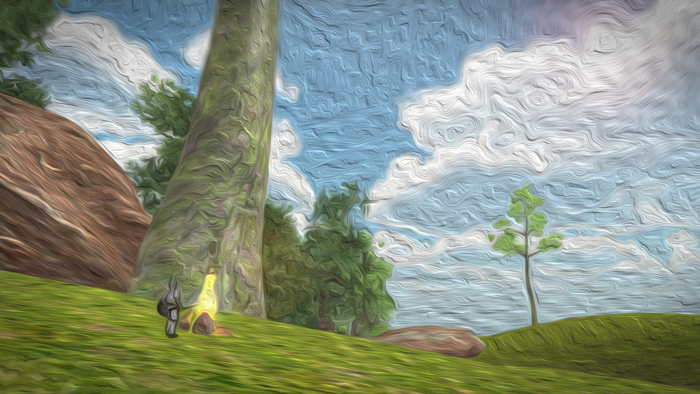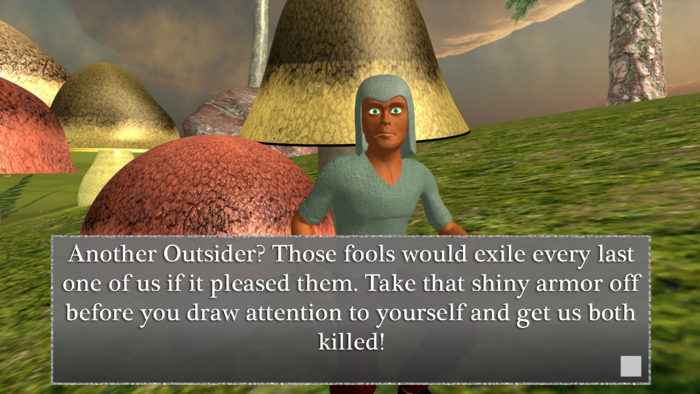Kicking it with Dan Rickmers
Lessons on Being Significant

Significant Games funded its flagship title "Insignificant" through Kickstarter Aug. 22. Blowing past its original goal of $1,760, backers pledged a whopping $12,447 by the deadline, unlocking nine stretch goals including a composed soundtrack, alchemy, underwater locations, and houses. "Insigificant" started as a one-man operation developed by Dan Rickmers, a New York University graduate now based in Pasadena, Ca.
“Insignificant” is a game that explores the idea of being “too small to have any sort of meaningful change all on our own,” because founder and developer Rickmers struggled with the ability to identify with game characters where he played “as the messiah destined to weave the fate of the Universe.” Your character in “Insignificant” will reflect that smallness by being pitted as an “Outsider.” Outsiders explore the massive World in which they’ve been exiled, interacting with it through the use of alchemy, enchantment, and other magic all the while trying to understand their place in the World and how they can make an impact on it.
Player Theory was fortunate enough to get to talk to Rickmers about the creation of his game and its funding through Kickstarter.
PT: Thanks for talking with us! For starters, I know you said that “most of us are too small to have any sort of meaningful change all on our own” was part of your inspiration for “Insignificant.” It seems like your game touches on problems people have with the real world – wanting non-magical explanations for why the world is the way it is, feeling small against the whole of the world, and the difficulty of making an individual impact. How philosophical is the game going to be?
DR: Oh, well thanks for interviewing us. We haven't had a good chance to reflect on our Kickstarter since it ended the other day, so we've got a lot to talk about!
“Insignificant” does deal with a lot of problems people have in the real world, even though it's in a largely fantastic setting. It's the story of a goldfish dropped into an ocean, where suddenly he can't see the fishtank walls he's been accustomed to, and all the other fish are at least 10 times his size; how do you handle that, either from a survivalist or an emotional perspective? They're problems I've been rubbing up against ever since I decided to make games, and I think anyone who is just starting out, who doesn't have a strong foothold in what they want to do, can relate to that feeling in “Insignificant.”
PT: What was your original inspiration to make that feeling into a game instead of some other creative medium?
DR: I've worked in a wide variety of creative medium, from film to illustration to that one play I wrote when I was in 6th grade, but none of them ever really fit the kind of story I wanted to tell. I want to tell the story of a World, not really the individual struggle of one guy, but the world he lives in. The world of “Insignificant” is very strange and unfamiliar, and yet it also takes place in some equivalent of the real world, so it's something new in a lot of ways. I think games are the best way to tell that kind of story, because there's so much detail and tone that goes into it that you need people to explore and find some of it on their own.
PT: What was your inspiration for your stretch goals? Some of them make sense – having a female character option, for instance – but others are more interesting (like Oculus Rift support). Can you expand on that?
DR: Most of my stretch goals are things that either would have or should have been in the game if I had only gotten the minimum amount. Making a game on a shoestring budget doesn't really make it as fully featured as it should be, so there are a lot of concessions I've had to make, and the stretch goals helped me to add some of those features back in. I mean there are still plenty of things I haven't been able to add to the budget, but we have enough to manage what we're doing [for] now at least.
As far as Oculus Rift goes, I've been very excited about all the things I've seen and heard about it, and I want to have a lot of games pop up that put you in some interesting perspective, like underwater, or in space, or say, being very small running around a kitchen. I just happen to be making a game that fits that third option, so I'm including support for that.
PT: How did you feel about beginning a Kickstarter to fund your game? What was that experience like?
DR: Kickstarter was probably the only way this game would have ever been able to see the light of day, so in some sense, it wasn't so much of an option as it was a necessity. That being said, I'm glad I did it. It was really stressful at times, because not everyone is kind and level-headed enough to be understanding of some of the shortcomings of a game like “Insignificant.” There were plenty of people who were very vocally negative, and for a creator of any kind, that can be tough to handle. On the other hand, there were also people who felt those same criticisms and understood that was one of the main reasons we were trying to get more funding in the first place. I'm thankful there were so many positive supporters, both for my own sanity and because the people who have backed the project and who are now rooting for the game to come out, those are almost all people who didn't even know we were making a game before all this.
PT: How did you promote yourselves to the point where you blew past 700 percent of your original goal? That’s a pretty massive success.
DR: I think people are much more willing to spend time promoting indies in theory than they are in practice. 60 percent of our funding came from people on Kickstarter. Nearly every media outlet completely brushed us off when we emailed them, even tiny indie sites, too. A few guys, including Giantbomb gave us a mention though, and those guys are great. After that, though, I knew we were on our own, so I looked into posting on forums, and it turns out there are a dozen crazy, convoluted hoops you have to jump through to get permission to talk about your indie game on forums about games. So I did my best to follow the rules and post about my game in the dark, dirty Kickstarter forum threads no one looks at. The most attention I got was when I incorrectly posted a reddit thread where everyone could see it on r/gaming. A mod noticed and took it down in an hour. That hour of people actually being able to see that “Insignificant” existed covered 15 percent of what we earned the whole month.
Aside from that, I would just tweet, Facebook, and email everyone I knew. Have you ever individually emailed everyone you know? I had to remember who each person was and judge whether it was okay to send an email asking for money to either this stranger, ex-boss, or ex-girlfriend. It's simultaneously the most time-consuming and emotionally draining experience I've had in a long time.
PT: Did you have outside support from your family and friends? What was their reaction when you said you were going to try and get strangers to pay for you to make them a game? (For the record, I also text my mother so she can validate my ideas.)
DR: I had a lot of family and friends who were actually rooting for me to do this, which I was honestly surprised by, because many of them don't play games. I think they were mainly admiring the amount of work and dedication I was putting into making “Insignificant.”
PT: Do you plan on hiring other people to help you make “Insignificant?” It’s probably pretty difficult starting a game by yourself.
DR: Ideally I would contract work from talented artists or programmers who could allow me to focus on other parts of the game, but our Kickstarter budget as it is just can't support something like that. It's really expensive to pay people for their work, especially if there's a lot of it, and I don't want to make people work for free. Artists need to value their work as much as I value it. We do have Marty Meinerz composing a soundtrack for the game, and that's about all our budget can handle. Marty is excellent though. The couple of songs he's already made fit the world very well, and composing is something I wouldn't be able to do even at a passable level.
PT: Are the images on the Kickstarter page the kind of graphics we can expect from the game? Why the Unity engine? Not to knock it – I’m excited that there’ll be Linux support as a result.
DR: No, the images on the Kickstarter page are all alpha-build shots built on the free version of Unity, and most of them include a number of stock assets that come with Unity. The game is going to be built in Unity Pro (which has a number of advantages which I believe are listed on the Kickstarter page), and there will be as many additional improvements as I have resources to make.
We went with Unity in the first place because it's one of the only game engines out there without licensing fees. We wouldn't be able to make the game on this kind of budget otherwise. Unity also does multiplatform pretty easily. I noticed a lot of indies were even publishing to WiiU and PS4 with Unity, and if this tool can make something like that easier, then I'm all for it. I don't think games should be limited to one system if they don't have to be. At the time I was creating the Kickstarter, the folks at Ouya were offering some money for Kickstarters who would do a timed exclusivity deal on Ouya, but to only have a game on Ouya? That's going to turn off anyone who doesn't have one, so I never opted for that.
PT: What can you tell us about the journey the Outsider can expect to go on? What kind of mobs and NPCs can they expect to encounter? What are other Outsiders like?
DR: When the Outsider is roaming the world, they might run into smaller creatures like snails, butterflies, rats, or ants, but they might also encounter some very large beasts like wolves. Most other Outsiders they'll meet are living in seclusion, because living at all is a challenge on its own. Some might see other Outsiders fairly often. Some might have never seen anyone else. Some might have just plain forgotten who they were before they were exiled. Some might have made their own makeshift village together. Some might be searching for some kind of cure for this magical proficiency they were cursed with, and some might have just gone full “Heart of Darkness” insane.

PT: What prompted you to incorporate one “profession” (alchemy) that seems to encompass the entire game and the resources you find there?
DR: Well, there are several resources players will find in the game. There are berries, which are used in alchemy to make other berries, and there are crafting materials like aluminum foil scraps, which can be used in the crafting system to make weapons and armor. There's also enchantment, which adds special effects to some of your equipment, and spell creation, which allows people to make whatever kinds of spells their hearts desire.
I added a lot of systems like that to give goal-oriented people some more tangible objectives. There are some people who don't just want to explore and see where things take them, and for those people, there are plenty of bars to fill up, points to dish out, and locked things to unlock. Phrasing it in that sort of casual way doesn't mean I'm just casually implementing them though; it's one of the most important aspects of the game for me, because I get really into those kinds of systems .
PT: Why isn’t there an inventory limit?
DR: I think people can make their own inventory limits. There will come a certain point where most people will look through all their stuff and say, “I just can't find anything,” and trash stuff. If people go and hoard everything they can find and they end up causing some kind of strange data leak, I could address it and see if it's something people are going to really have a problem with, but if not, I'd rather leave it up to the player to determine how much inventory space is too much.
PT: You said “Insignificant” was the flagship game for Significant Games. What other types of games do you want to release? Where do you hope you’ll be five years from now?
DR: We already have some ideas in place for a second game which is a completely different type of game than “Insignificant,” but that's sort of how I want to do things with Significant Games. Rather than make a lot of largely similar games, I want to try and make as many unique and different types of games as we can – an MMO where all the jobs are normal jobs like baking or a “Pokemon”-type game where you're a cute animal capturing and battling humans instead. I want to make seriously well thought-out games out of silly and odd ideas.
PT: When do you think the game will be released?
DR: On Kickstarter, we said backers would get their stuff around July 2014, so I'm making that our deadline.

PT: Is the Cageberry real?
DR: I'll have to double check copyright laws and be sure it's okay to use the likeness of Nick Cage's face on a berry, but I'm pretty committed to my stupid jokes, so yeah, most likely there will be a Cageberry in the game.
As Rickmers said, backers can expect to receive their copy of the game (and other pledge rewards depending on the tier of their donation) a year from now. In the meantime, you can follow the development of “Insignificant” on Twitter, Facebook, YouTube, and Twitch.tv. Significant Games is also still taking donations on their website via Paypal.
Significant Games definitely has the potential to produce an amazing, innovative game where you can fully immerse yourself in a new World, and given Rickmers’ interaction with the community, there’s no excuse not to check out “Insigificant!”
Source: Kickstarter: Insignificant Significant Games Twitter: Dan Rickmers Facebook: Significant Games YouTube: Dan Rickmers Twich.tv: Significant Games